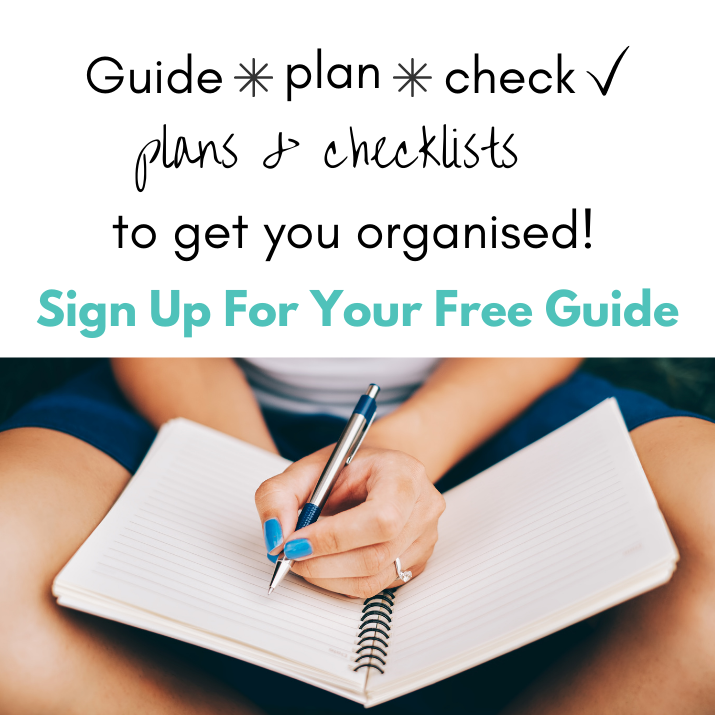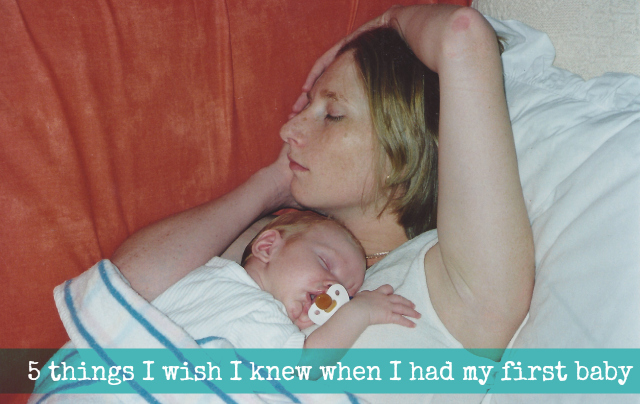This post is part of the baby daze series. In the annual survey I ran last year, when I asked what topics did readers want me to cover, the baby stage came up as a popular one. Over the next month, I will be sharing some of my experiences with babies and some collective wisdom from the readers of Planning With Kids on adjusting and coping with life with a new baby.
***********
I was 26 when I had our first child. I was the first of my siblings to have a baby, one or two friends had also had babies, but they were in Mildura, so I had only minimal contact with them. So it is safe to say I was fairly inexperienced with babies when our son arrived.
There is so much about the first few months that I remember so clearly, other parts are (and were then) a blur. But I do remember wishing that I knew a bit more before the baby arrived. Here are five things I wish I had known before our baby was born.
1. You cannot predict how you will feel after you have the baby
Just prior to falling pregnant I made a change in career path and took up a new role completely out of my comfort zone so I could obtain people management experience. I really loved the role, so when I became pregnant I organised with my work that I would return three months after the birth. With the benefit of hindsight all I can say to that is WOW! From the minute he was born I knew I wouldn’t want to go back to work in three months.
So in those precious first three months, not only was I navigating how to be a mum, but I spent a lot of mental energy on working out how I could change the expectations of my work place. Thankfully they were accommodating and while I didn’t get exactly what I was after, I returned to work 4 days a week at around 9 months after our son’s birth.
On the other hand I know mums who after three months at home with baby, organised an earlier return to work than planned with their employer as they weren’t enjoying their time at home as much as they thought they would. Neither of these situations is better than the other, they are just different.
My advice: Allow yourself the greatest flexibility you can afford. You can never predict how you will feel those first few months postpartum. Flexibility gives you options to make sure you are happy. Happy mum = happy baby.
2. Babies don’t just fall to sleep straight away
While I would never have imagined it at the time, one my fondest memories of the first baby experience is of me crying to my maternal and child health nurse when she visited me at home the first time. Our son was a great feeder and loved to soothe himself with sucking.
In the first 36 hours we were home from hospital, I pretty much fed him non stop. I would feed him, burp him, try to put him in his bassinet to sleep. I would give him a little pat, walk out and pray he would go to sleep. He wouldn’t, he’d cry and make this sucking motion. I thought he must still be hungry, so I would feed him again. Then I would repeat this over and over again.
By the time the maternal and child health nurse arrived, I was utterly exhausted. I had showered, tidied the house and made sure I was presentable. I wanted to show her I was coping. Liz was her name and from the moment I saw her at the front door I liked her.
After the formalities she looked at me hard and said “How are you feeling?” I went to say “fine” but tears just poured out and I started sobbing. Explaining how he wouldn’t sleep and I was feeding all the time, I was exhausted and had no idea what I was doing!
Liz was amazing. She told me she always felt better when mums let her know how they were really feeling. She asked me lots of questions about what I was doing with our baby. She showed me some techniques to settle him off to sleep and explained that babies will cry a little before going to sleep and at such a young age are unlikely to go to sleep without assistance. Liz used a patting technique with our baby and he went to sleep within a few minutes for her and stayed asleep for the rest of her visit and another two hours after she left!
I couldn’t believe my baby was sleeping! I used her settling techniques and sometimes it took time to get him to sleep, but I didn’t automatically try to feed him if he cried a little and stayed with him to help him go off to sleep.
My advice: Getting a baby to sleep is harder than you imagine. Be prepared to try a few techniques to settle your baby and find something that works for your bub. Every baby is different and what works for one bub, may not work for another, so there is not point in comparing. Baby sleeping is not a competitive sport, don’t feel compelled to take on advice that sits uncomfortably with you.
3. It is not the time for new goals and projects
Prior to having the baby, I thought in my three months at home I was going to:
- Sort out all of the photo albums
- Write journal entries every day
- Update my CV
- Read a book each week
Again, I say to myself WOW! I am sure there are mums out there who manage/d to set goals and projects for themselves and achieve them in the first year of baby’s life. For me though I was on such a steep learning curve that all my energy went into learning to parent our beautiful baby. I looked at the boxes of photos and empty journals and would feel like I wasn’t achieving anything.
I had to let go of these projects and realise I had been misguided in setting them. I replaced them with far more practical and achievable goals like:
- Having a shower each day
- Leaving the house once a day
- Having the evening meal ready before 9pm
My advice: Becoming a mum is a huge adjustment. Adding additional goals and workload at this time can be stressful and can have a detrimental impact on your self confidence. Give yourself space to enjoy this time without extra self imposed pressures.
4. It is only a sleeping problem if it is a problem for you
As a first time mum it super easy to become obsessed with sleep. The baby’s sleep, your sleep, the baby down the road’s sleep, your partner’s sleep, how your baby goes to sleep – anything to do with sleep really.
There is so much information out there now on baby sleep and recommendations vary wildly. Parents, parents in laws may have done things differently, the multiple midwives you saw in hospital could have all told you different things. Everyone has advice for you on how to make your baby sleep and as a new mum you are after that magic formula that makes baby sleep a breeze.
It wasn’t until I went to an information evening on baby sleep many years after my first baby, that I heard one of the best bits of advice on baby sleep. Someone in the audience explained what was happening with her baby’s sleep and asked the expert if she thought her baby had a sleeping problem? The expert responded with a question – is it a problem for you (she was rocking her to sleep)? The mum said no as she was happy to do it. The expert then said:
“It is only a sleeping problem if it is a problem for you.”
You often hear people say things like you are “creating a rod for your own back”, “you are setting up bad habits” or “you should never feed a baby to sleep”. I think this view isn’t helpful. No one knows your family’s situation. Certainly if you start certain sleep routines with your baby they will stick, but if you are happy with them (and they are safe!), don’t let others’ judgement bother you.
My advice: While on some sleepless nights in the baby’s first year, it seems like this stage of life is never going to end but it does and it goes relatively quickly. Be comfortable with the sleeping set up of your baby and go with your instincts.
5. Being tired makes you cry
According to the United Nations sleep deprivation is a form of torture. I can clearly remember being so tired that I would cry over very simple things that normally wouldn’t bother me – for example I did literally cry over spilt expressed breast milk! There is however obviously a difference from crying due to mental health issues (if you think this might be you, please see a medical professional for help) and crying from being over tired. But it has been proven that sleep deprivation does make you more likely to cry:
Biomedical researchers have identified four biological mechanisms that function as catalysts influencing the amount of tears we will shed at a given time: genetic influences, dietary factors, hormone levels and circadian rhythms (we are more likely to cry if we are sleep deprived and at certain times of day). {source}
My advice: Sleep deprivation is incredibly tough. Nana naps are an amazing antidote to sleepless nights. Really try to sleep when baby is sleeping during the day to catch up.
So what would you add? Would love to hear what you wish you knew before having your first baby!
Do you want some free tools to help you organise the chaos of family life?
The Planning With Kids Newsletter is called NOW with Nicole Avery. It is an upbeat weekly newsletter that aims to help you organise the chaos of family life and find simple ways to enjoy it more.
My philosophy is to organise the known and repetitive tasks of family life so you create a solid foundation that allows you to manage the more unpredictable and challenging elements.
You can sign up for the free newsletter in the sign-up box below! To say thank you for signing up for the newsletter I have created a simple but super useful guide for you to help you organise the chaos of family life. The free download helps simplify some of the repetitive and time-consuming tasks that occur as part of daily family life. Guide ✼ Plan ✼ Check ✓ contains 10 separate printable tools that you will be able to use over and over again.

Sign up and organise the chaos of family life!

